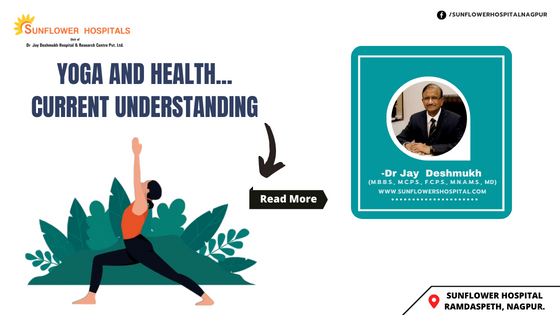What is yoga?
Yoga uses interactions with several bodies and mind and behavioral practices to promote optimal health over the lifespan and improve different aspects of physical and mental health.
What are the components of yoga?
Yoga has three main components. Postures or poses known as asanas, breath control or regulated breathing that is pranayama, and meditation and relaxation known as Dayana. Some also include dietary, social, mental, and spiritual recommendations and harmony with nature.
Have the benefits of yoga been scientifically evaluated?
The benefits of yoga have been evaluated in more than 700 randomized controlled studies and more than 250 meta-analyses. These studies have also found space in reputed medical journals all over the world.
In which medical condition, yoga has been found to be the best medical adjunct along with conventional medical therapy?
The best evidence suggests that yoga can be a helpful intervention in Physical fitness, Pregnancy Stress and Anxiety Cardiac rehabilitation, Cancer fatigue and insomnia, depression, fibro-YOGA, AND HEALTH… CURRENT UNDERSTANDING. Myalgia, low back pain, multiple sclerosis, and Parkinson’s disease improve coordination and balance.
What about yoga and pregnancy?
Yoga is more effective. Yoga is used as a complementary or alternative practice for the improvement of health and giving relief to a variety of medical conditions. Many medical centers including the Cleveland Clinic and Mayo Clinic in the US supported by scientific studies and research are bringing yoga into the mainstream of medical education, research, and clinical practices. They are also revealing their limitations. Yoga cannot be a replacement for education. However, it is extremely important to know that yoga can improve your quality of life.
Then walking decreases the risk of pregnancy-induced hypertension, pre-eclampsia, and Intrauterine growth restriction. Individuals should be properly assessed before.
Enrolling them in yoga sessions.
What about yoga to reduce occupational stress reduction?
Stress, sleep quality and heart rhythm improve after yoga therapy. It is also known to reduce anxiety. It is known to reduce depression, insomnia, balance function, and functional walking ability.
What about burn-outs?
These are very common in software engineers, doctors, and nurses on emergency duties. Mindfulness-based cognitive behavioral therapy associated with yoga therapy certainly helped most of them.
What about cardiovascular disease and rehabilitation?
In many international studies, it was found that quality of life, triglycerides, HDL cholesterol, blood pressure, and body mass index improved. Yoga also reduced stress levels in many individuals after bypass surgery or after angioplasty, No chapter in medical textbooks based on metabolic and atherosclerotic disorders is complete without the mention of yoga and other exercises. Ultimately, proper mind and body practices are always necessary for proper recovery.
Author: Dr Jay Deshmukh
Dr Jay Deshmukh is Chief Physician and Director, Sunflower Hospital, Nagpur Honorary Physician to Honorable Governor of Maharashtra and PondicherryCentral. Dr Jay Deshmukh is an M.B.B.S., M.C.P.S., F.C.P.S., M.N.A.M.S., MD From Internal Medicine – Bombay and New Delhi.


